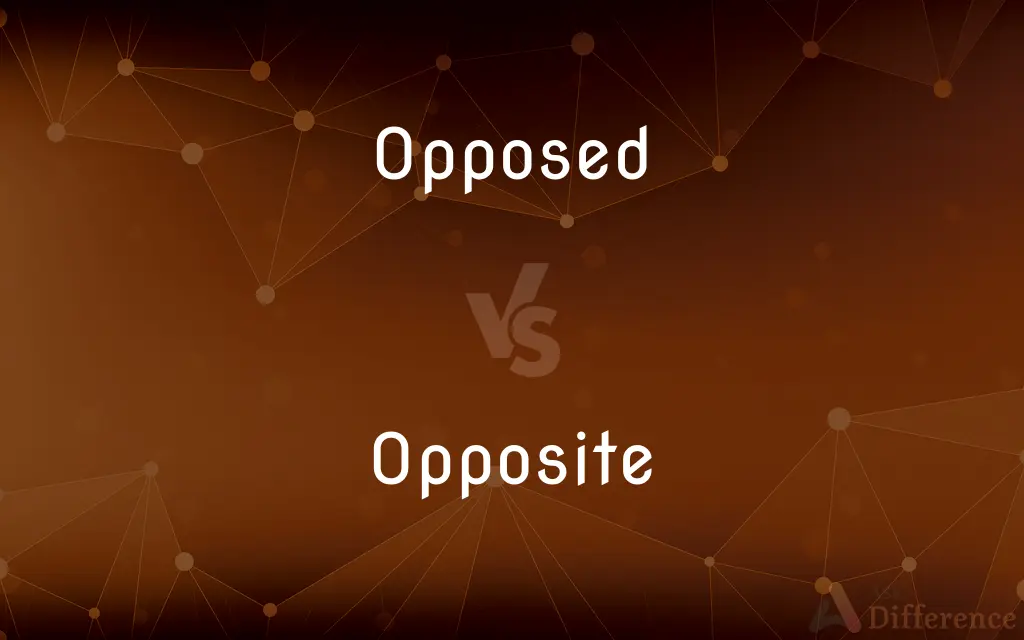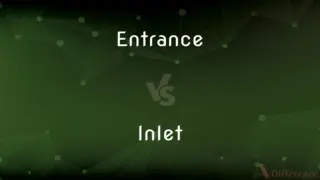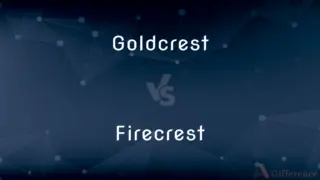Opposed vs. Opposite — What's the Difference?
By Fiza Rafique & Maham Liaqat — Updated on April 17, 2024
"Opposed" refers to being in conflict or disagreement with something, highlighting a relational dynamic; "opposite" describes a position, direction, or characteristic that is diametrically different from another.

Difference Between Opposed and Opposite
Table of Contents
ADVERTISEMENT
Key Differences
"Opposed" is primarily used to describe a stance of resistance or disagreement against ideas, policies, or entities. On the other hand, "opposite" often refers to spatial, directional, or conceptual polarities, such as in locations or characteristics.
In usage, "opposed" implies an active resistance or antagonism, such as in debates or conflicts where parties are against each other. Conversely, "opposite" simply denotes the relationship of being on completely different ends of a spectrum or area, like north is to south.
The term "opposed" can be used in more abstract or relational contexts, such as being opposed to a philosophy or a way of thinking. Whereas "opposite" is frequently used in more tangible and observable contexts, like describing two sides of a street or contrasting colors.
When discussing emotions or ideologies, "opposed" is the more appropriate term to express dissent or non-compliance. On the other hand, "opposite" is often utilized in discussions of physical arrangements or when describing things that are inherently different, not in conflict.
"Opposed" often appears in political or social discussions, indicating opposition to policies or norms. In contrast, "opposite" is a common term in scientific, educational, and everyday descriptions, explaining basic relationships or orientations.
ADVERTISEMENT
Comparison Chart
Meaning
In conflict or disagreement with
Located at or pertaining to the other end
Context of Use
Abstract, relational
Spatial, physical, conceptual
Connotation
Resistance, antagonism
Diametrical difference, neutrality
Common Usage
Political, ideological opposition
Directions, locations, characteristics
Implication
Active stance against something
Natural or inherent contrast
Compare with Definitions
Opposed
Set against, in disagreement or hostility to.
They were strongly opposed to the new development plan.
Opposite
Placed or located directly across from something else.
Their house is on the opposite side of the lake.
Opposed
To be in conflict with.
He is opposed to our views on climate change.
Opposite
Being diametrically different from something.
Her views are the opposite of mine.
Opposed
Positioned against as an adversary.
The two candidates are opposed in the upcoming election.
Opposite
Completely different or contrary in nature.
They work in opposite fields of research.
Opposed
Acting in contradiction to.
Their actions are opposed to the group's rules.
Opposite
Pertaining to the other end or extreme.
He sat at the opposite end of the table.
Opposed
Being resistant to certain ideas or practices.
She is morally opposed to hunting.
Opposite
In a position facing another and typically separated by a space.
They sat opposite each other in silence.
Opposed
To be or act in contention or conflict with
Opposed their crosstown rivals in the season finale.
Opposite
Placed or located directly across from something else or from each other
Opposite sides of a building.
Opposed
To be hostile or resistant to; try to prevent
Opposes the building of a new police station.
Opposite
Facing the other way; moving or tending away from each other
Opposite directions.
Opposed
To set as an opposite in position
Opposed the painting with a mirror across the room.
Opposite
Altogether different, as in nature, quality, or significance
The effect of the medication was opposite to that intended.
Opposed
To present in counterbalance or contrast
Ideas that were opposed to each other in her first book.
Opposite
Sharply contrasting; antithetical
Had opposite views on the subject.
Opposed
To be or act in opposition.
Opposite
Growing in pairs on either side of a stem
Opposite leaves.
Opposed
Acting in opposition; opposing.
Opposite
Arranged on the same radius as another part, as stamens and petals.
Opposed
Being, of having an opponent; not unopposed.
Opposite
One that is opposite or contrary to another.
Opposed
Opposite.
Opposite
An opponent or antagonist.
Opposed
Simple past tense and past participle of oppose
Opposite
An antonym.
Opposed
Characterized by active opposition; as, two bitterly opposing schools of thought.
Opposite
In an opposite position
They sat opposite at the table.
Opposed
Acting in opposition to; as, the opposing sector of the same muscle group.
Opposite
Across from or facing
Parked the car opposite the bank.
Opposed
In opposition to (a policy or attitude etc.);
An opposing vote
Opposite
In a complementary dramatic role to
He played opposite her.
Opposed
Being in opposition or having an opponent;
Two bitterly opposed schools of thought
Opposite
Located directly across from something else, or from each other.
She saw him walking on the opposite side of the road.
Opposite
(botany) Of leaves and flowers, positioned directly across from each other on a stem.
Opposite
Facing in the other direction.
They were moving in opposite directions.
Opposite
Extremely different; inconsistent; contrary; repugnant; antagonistic.
Opposite
Something opposite or contrary to something else.
Opposite
A person or thing that is entirely different from or the reverse of someone or something else; used to show contrast between two people or two things.
She is the opposite of her ex-boyfriend who abused her both physically and verbally nearly every day for five years. She now works as an advocate and supportive listener for others who have endured abusive relationships.
Opposite
An opponent.
Opposite
An antonym.
"Up" is the opposite of "down".
Opposite
(mathematics) An additive inverse.
Opposite
In an opposite position.
I was on my seat and she stood opposite.
Where's the bus station? -Over there, just opposite.
Opposite
Facing, or across from.
He lives opposite the pub.
Opposite
In a complementary role to.
He played opposite Marilyn Monroe.
Opposite
(television) On another channel at the same time.
The game show Just Men! aired opposite The Young and the Restless on CBS.
Opposite
Placed over against; standing or situated over against or in front; facing; - often with to; as, a house opposite to the Exchange; the concert hall and the state theater stood opposite each other on the plaza.
Opposite
Situated on the other end of an imaginary line passing through or near the middle of an intervening space or object; - of one object with respect to another; as, the office is on the opposite side of town; - also used both to describe two objects with respect to each other; as, the stores were on opposite ends of the mall.
Opposite
Extremely different; inconsistent; contrary; repugnant; antagonistic.
Novels, by which the reader is misled into another sort of pleasure opposite to that which is designed in an epic poem.
Particles of speech have divers, and sometimes almost opposite, significations.
Opposite
Set over against each other, but separated by the whole diameter of the stem, as two leaves at the same node.
Opposite
One who opposes; an opponent; an antagonist.
The opposites of this day's strife.
Opposite
That which is opposed or contrary in character or meaning; as, sweetness and its opposite; up is the opposite of down.
The virtuous man meets with more opposites and opponents than any other.
Opposite
Two words that express opposing concepts;
To him the opposite of gay was depressed
Opposite
A relation of direct opposition;
We thought Sue was older than Bill but just the reverse was true
Opposite
A contestant that you are matched against
Opposite
Something inverted in sequence or character or effect;
When the direct approach failed he tried the inverse
Opposite
Being directly across from each other; facing;
And I on the opposite shore will be, ready to ride and spread the alarm
We lived on opposite sides of the street
At opposite poles
Opposite
Of leaves etc; growing in pairs on either side of a stem;
Opposite leaves
Opposite
Moving or facing away from each other;
Looking in opposite directions
They went in opposite directions
Opposite
Altogether different in nature or quality or significance;
The medicine's effect was opposite to that intended
It is said that opposite characters make a union happiest
Opposite
Characterized by opposite extremes; completely opposed;
In diametric contradiction to his claims
Diametrical (or opposite) points of view
Opposite meanings
Extreme and indefensible polar positions
Opposite
Directly facing each other;
The two photographs lay face-to-face on the table
Lived all their lives in houses face-to-face across the street
They sat opposite at the table
Common Curiosities
What does it mean to be opposed?
To be opposed means to be in conflict, disagreement, or resistance to something.
Can "opposed" have a physical implication?
While "opposed" usually refers to abstract disagreements, it can occasionally imply physical opposition in scenarios like sporting events.
What kind of relationships does "opposite" denote?
"Opposite" refers to relationships characterized by diametrical difference, often without the implication of conflict.
Is "opposed" only used in negative contexts?
Generally, "opposed" has a negative connotation as it implies resistance or disagreement.
What scenarios typically use "opposed"?
"Opposed" is used in contexts of disagreement or resistance, such as political or ideological opposition.
Can "opposite" denote anything other than location?
Yes, "opposite" can also refer to contrasting characteristics, directions, or concepts.
How do "opposed" and "opposite" differ in emotional contexts?
"Opposed" is used to express opposition and resistance, while "opposite" might describe contrasting emotional states without conflict.
How does "opposite" relate to physical locations?
"Opposite" describes things that are situated directly across from each other, like opposite sides of a street.
How does "opposite" help in understanding spatial relationships?
"Opposite" helps clarify spatial relationships by indicating direct positioning across from another point or object.
Are there contexts where both terms can be used interchangeably?
In general, the terms are not interchangeable due to their different implications of conflict versus mere difference.
Can "opposed" be used in a legal context?
Yes, "opposed" can be used in legal contexts to denote opposition to motions, proposals, or legal actions.
What visual imagery might help understand "opposite"?
Imagining two objects at either end of a line or facing each other across a space helps visualize the concept of "opposite".
How do "opposed" and "opposite" function in a debate?
In a debate, "opposed" would describe the participants' conflicting views, while "opposite" might describe their positions on the stage.
What is a common misunderstanding between "opposed" and "opposite"?
A common misunderstanding is assuming both imply conflict; "opposite" simply indicates difference without conflict.
How might someone explain their position if they are "opposed" to something?
They would explain their reasons for disagreement or resistance to the idea or policy.
Share Your Discovery

Previous Comparison
Entrance vs. Inlet
Next Comparison
Goldcrest vs. FirecrestAuthor Spotlight
Written by
Fiza RafiqueFiza Rafique is a skilled content writer at AskDifference.com, where she meticulously refines and enhances written pieces. Drawing from her vast editorial expertise, Fiza ensures clarity, accuracy, and precision in every article. Passionate about language, she continually seeks to elevate the quality of content for readers worldwide.
Co-written by
Maham Liaqat













































